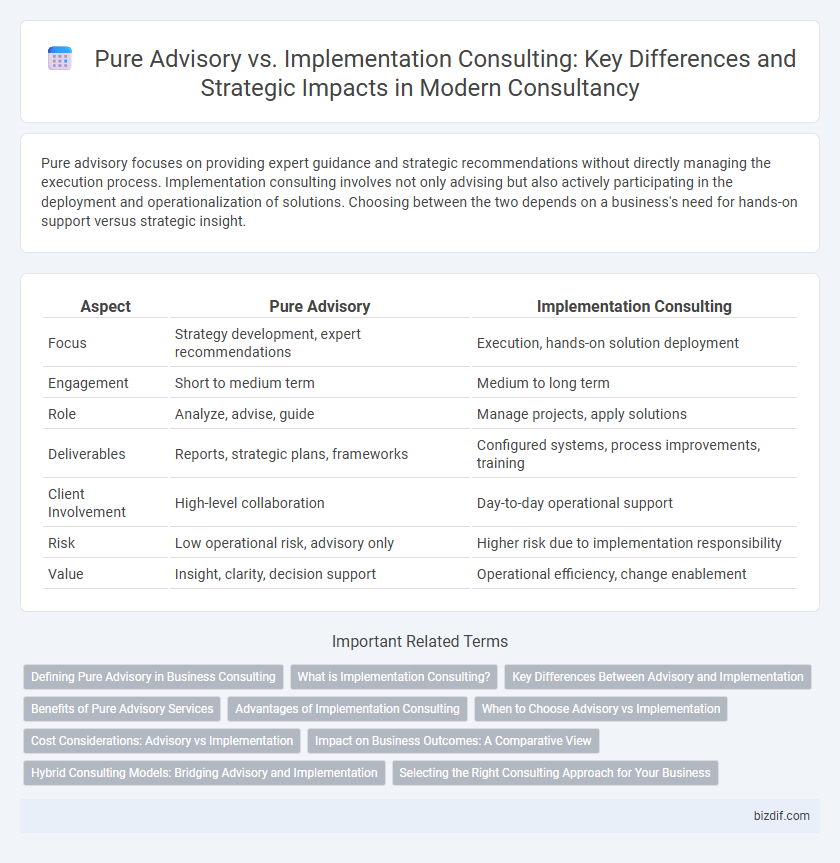Pure advisory focuses on providing expert guidance and strategic recommendations without directly managing the execution process. Implementation consulting involves not only advising but also actively participating in the deployment and operationalization of solutions. Choosing between the two depends on a business's need for hands-on support versus strategic insight.
Table of Comparison
| Aspect | Pure Advisory | Implementation Consulting |
|---|---|---|
| Focus | Strategy development, expert recommendations | Execution, hands-on solution deployment |
| Engagement | Short to medium term | Medium to long term |
| Role | Analyze, advise, guide | Manage projects, apply solutions |
| Deliverables | Reports, strategic plans, frameworks | Configured systems, process improvements, training |
| Client Involvement | High-level collaboration | Day-to-day operational support |
| Risk | Low operational risk, advisory only | Higher risk due to implementation responsibility |
| Value | Insight, clarity, decision support | Operational efficiency, change enablement |
Defining Pure Advisory in Business Consulting
Pure advisory in business consulting centers on providing expert strategic guidance without direct involvement in execution or operational activities. It emphasizes analysis, recommendations, and planning to help organizations identify opportunities, mitigate risks, and align business objectives. This form of consulting relies heavily on industry expertise, data-driven insights, and tailored frameworks to create actionable strategies for clients.
What is Implementation Consulting?
Implementation consulting focuses on executing strategic plans by managing projects, aligning resources, and ensuring operational changes are successfully integrated within an organization. Unlike pure advisory consulting, which centers on providing expert recommendations and strategic guidance, implementation consultants actively oversee the practical application of solutions to achieve measurable business outcomes. This approach involves hands-on support such as process redesign, technology deployment, and change management to drive effective transformation.
Key Differences Between Advisory and Implementation
Pure advisory consulting delivers strategic insights, comprehensive analysis, and expert recommendations to guide decision-making without direct involvement in execution. Implementation consulting focuses on applying these strategies by managing projects, coordinating resources, and ensuring the practical realization of planned initiatives. Key differences include advisory's emphasis on high-level guidance and implementation's role in operationalizing solutions to achieve measurable business outcomes.
Benefits of Pure Advisory Services
Pure advisory services deliver unbiased, strategic insights that prioritize long-term value creation without the distractions of implementation constraints. Clients benefit from expert recommendations grounded in deep industry knowledge, enabling informed decision-making tailored to optimize business performance. This approach enhances organizational agility by providing clear, actionable guidance that can be adapted flexibly across diverse operational contexts.
Advantages of Implementation Consulting
Implementation consulting offers the advantage of directly translating strategic plans into actionable processes, ensuring measurable outcomes and quicker ROI for businesses. It enables real-time problem-solving and adaptation to operational challenges, which pure advisory services may not address effectively. With hands-on involvement, implementation consultants bridge the gap between theoretical recommendations and practical execution, enhancing project success rates.
When to Choose Advisory vs Implementation
Pure advisory consulting is ideal when organizations need expert guidance on strategy development, market analysis, or risk assessment without immediate operational changes. Implementation consulting becomes essential when companies are ready to execute strategies, optimize processes, or integrate new technologies with hands-on support. Choosing between advisory and implementation depends on the client's readiness for change, resource availability, and the complexity of the project execution.
Cost Considerations: Advisory vs Implementation
Pure advisory consulting primarily involves strategic guidance, resulting in lower upfront costs due to limited resource deployment and shorter engagement duration. Implementation consulting typically incurs higher expenses as it demands hands-on project management, technology integration, and extended timelines. Businesses must weigh initial advisory fees against the comprehensive, often more substantial costs linked to full-scale implementation services.
Impact on Business Outcomes: A Comparative View
Pure advisory consulting delivers strategic insights and recommendations that guide decision-making, often enhancing clarity and direction for businesses. Implementation consulting drives tangible execution of strategies, ensuring that plans translate into measurable improvements in operational performance and financial results. Organizations that combine both advisory and implementation consulting benefit from holistic solutions that not only identify opportunities but also achieve sustained business outcomes.
Hybrid Consulting Models: Bridging Advisory and Implementation
Hybrid consulting models merge pure advisory expertise with hands-on implementation, enabling clients to benefit from strategic insights alongside practical execution. This approach reduces the gap between planning and action, ensuring recommendations are not only sound but also directly embedded within business processes. By integrating advisory and implementation, organizations achieve faster realization of project goals and improved alignment with operational realities.
Selecting the Right Consulting Approach for Your Business
Choosing between pure advisory and implementation consulting hinges on your business needs and available internal resources. Pure advisory offers strategic guidance and expert recommendations to shape decision-making, while implementation consulting drives execution and hands-on management of projects to ensure tangible results. Assessing your team's capacity for change management, project oversight, and operational challenges helps determine the optimal consulting approach for maximizing growth and efficiency.
Pure Advisory vs Implementation Consulting Infographic

 bizdif.com
bizdif.com